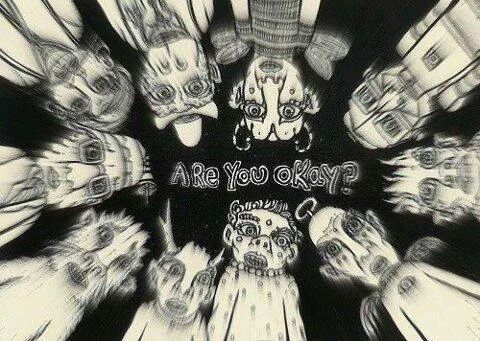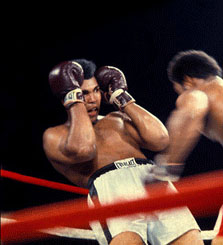Everyone scrambling to figure out what just happened, pointing fingers at one another, backtracking from shattered prognostications, making new ill-considered prognostications, claiming to have The Answer, forgetting that there is no one answer (and that perhaps there is no answer), and announcing the zombie apocalypse.
Let a hundred post-mortems bloom, each of which may be right, none of which can come close to capturing the actual complexity of what just took place, or what is about to happen. I certainly included my own election post-mortem, and today I'm going to risk an kind of after-action review.
I don't like driving, but it is a necessary evil, and out of boredom, I'll switch on the radio.
I should know better than to listen to National Public Radio. It unfailingly provokes me with the anesthetic pretensions of the chattering class, and I've done it again. I tuned into the Diane Rehm Show a couple of days ago, and of course she hosted the low-fat vanilla cognoscenti from the establishment newspapers and the oxygen-thieving, technocratic think-tank seed-ticks that infest Dupont Circle.
In describing both how Trump managed to get elected (along with Republicans across the board) and what a Trump presidency might look like, they hit just the right note of mild alarm about Trump, then went on to associate his stated opposition to trade agreements like NAFTA, CAFTA, and the proposed Trans-Pacific-Partnership (TPP) with xenophobia, and dismissed the former out of hand as 'protectionism', which, as anyone with their sophistication knows, is just backward and silly. The Democrats, they agreed, just failed to 'connect' sufficiently with voters, and they conceded in throwaway remarks that Sanders had tapped into a vein of 'protectionist' discontent as well. These were not the main remarks, but smuggled in a manner that let listeners know that opposition to these trade agreements is some kind of anachronistic evolutionary artifact, and that most economist agree that these agreements are not only good, but absolutely necessary.
It dawned on me then that these people were already setting the stage for the next run against the Republicans, and that they were going to do exactly what they did this time. The Democratic Party establishment is trying to return everyone to the pre-election default as if nothing had happened. Anyone who agrees with 'most economists', if they have actually studied what 'most economists' say and compared what economists think with economic reality, is showing all the insight of a lemming; and that should be a tip-off. Economists, with few exceptions, are our present-day equivalent of rain-makers and glim-droppers. They are scam artists at worst, and ideologues at best.
In Michigan, where I live now, people are like everyone else, but there is a special and visceral hatred of these trade agreements, as there is in Wisconsin, Ohio, and Pennsylvania, which all went blue for Obama, and all went red for Trump. And here in Michigan, we annulled Nate Silver and the rest of the professional soothsayers during the Democratic Primary by giving the state to Bernie Sanders. the margin of the win against Clinton and for Sanders was based on that justifiable hatred of those trade agreements. And the margin of loss for Clinton against Trump in every one of those formerly blue states was based on the justifiable hatred of those trade agreements.
Yes, every single for Trump enabled racism, sexism, homophobia, and xenophobia. But, the Trump vote cannot be reduced to this; and moreover, none of these forms of hatred exist in a vacuum. All are exacerbated by politico-socio-economic conditions that create the insecurity which then breathes life into these forms of hatred.
Just as significantly, with regard to the chattering of the NPR savants, it is a wildly erroneous assumption that most people have a clear idea of who they are voting for, what their policies might actually be, the context of those policies, or their history. People vote on impressionism (Clinton's forte), on single issues (whether it is abortion or trade agreements or the threats of chemtrails and subway bombers), and sometimes just because a candidate channels that great big Fuck You! that has been festering in their guts after years, even decades, of increasing economic insecurity. Sometimes people are correct in their apprehension of a candidate, and sometimes wrong. On trade agreements, whether people understand them or not (the beltway buffs certainly and consistently misrepresent them), there really is good reason to oppose them, and Sanders was largely correct in his own representation of them. Sanders' supporters, many of them, also had a very good grasp of these agreements as an essential component of predatory, Wall Street capitalism.
For the xenophobes who decry the massive influx of migration from the South, just FYI, these trade agreements were precisely the latest social catastrophe in Latin America, where NAFTA and CAFTA and International Monetary Fund debts have commoditized the commons, ripped of the poor with 'structural adjustment programs,' privatized public resources, and utterly destroyed small farms by facilitating a systematic program in the US of taxpayer subsidized agricultural dumping.
Republicans and Democrats alike have supported this system, the shorthand for which is 'neoliberalism,' and if you think Trump and the Republicans are going to back away from bleeding the global periphery and slow down the in-progress transfer of wealth from Main Street to Wall Street, I want some of what you are smoking. And still, what are the NPR guests suggesting the Democratic Strategy will be for 2018 and 2020?
You guessed it. "We are not the Republicans." In other words, the campaign of Hillary Clinton.
In 1974, world champion boxer Muhammad Ali fought the monstrously powerful George Foreman in Zaire. Many fight watchers (maybe some were named Nate Silver) believed Foreman would defeat Ali, because Foreman was considered knock-out proof and he could deliver flurries of punishing body blows that would normally break down his opponents, whereupon they would lose the capacity to defend themselves and be open to the one blow that would drop them. Ali employed a strange tactic. He leaned back on the flexible ropes around the ring, covering up with his hands and arms. Instead of Ali's body absorbing the brunt of the shock from Foreman's punches, the shock was absorbed by the ropes. By the seventh round, Foreman was so exhausted from delivering hundreds of ineffective blows (he was 'punched out' in boxing terms) that Ali knocked Foreman out in the eighth.
Now the Democratic Party technocrats want to repeat their strategy again in two years, the strategy of "We are not Republicans." They seem no not have noticed that they are becoming more irrelevant by the day.








FEAR... fear... violence
ReplyDeleteI have been surprised to hear from some of the media folk that I listen to, just exactly how totally and completely terrified they are at the prospect of a Trump-presidency. Minority groups of all stripes!!!
Fear-mongering - perhaps, perhaps-not, we shall see. Downtown Portland Oregon has seen more violent protests than in years or perhaps ever. Four nights in a row. Organizers are unable to appeal to non-violence. Broken cars, windows, street battles, including major freeway intersections. Supported by rap music and people in cars. All races, people as young as 10 years old.
Imagine if Trump had lost the election? What kinds of violence would we be facing? I imagine a more systematic type of assassination campaign/killing spree.
Everyone assumed Clinton would win, so why bother to vote for the lesser-evil -- I'm not sure that a less-evil candidate existed? Clearly this country has been heading into a situation where civil unrest was rising. A growing phenonomon.
Very few people in this country feel secure. As you stated above -- economically. An important thing to point out, I really hate the stupid-white-men narrative. When I wander around this country talking to anyone (all-colors, all-classes, they are not stupid.
You didn't mention the war-state. I for one was hoping that a de-escalation with Russia would be a good thing. Hoping the first thing that Trump did was hop on a plane and visit with Putin. ???not looking good that way either.
Inevitably, war-on-everything will continue...
What happened, a few months ago you said trump would never be president, lol, it was funny, like you had complete control of the universe. I love reading your blog i laugh so hard, it's fun watching your merry band of sycophants, hang on your every word...I'm laughing so hard right now I can't even type this
ReplyDeleteRegular Chasin' Jesus reader here, and your comment sounds to me as if you've posted it to the wrong blog.
Delete